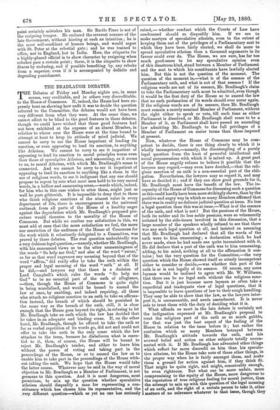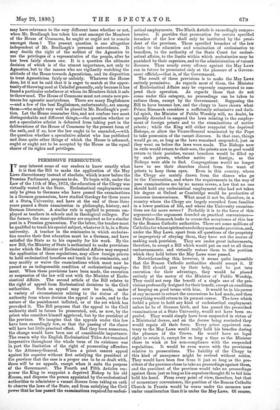THE BRADLAUGH DEBATES. T HE Debates of Friday and Monday nights
are, in some senses, very creditable, and in others very discreditable, to the House of Commons. If, indeed, the House had been ex- pressly bent on showing how unfit it was to decide the question referred to the Committee, the debates would not have been very different from what they were. At the same time, we cannot affect to be blind to the good features in these debates, though we could have wished that those good features had not been exhibited at the expense of an absent Member, in relation to whose case the House were at the time bound to attempt at least to keep its attitude of mind judicial. We cannot be sorry to see the House impatient of lending its sanction, or even appearing to lend its sanction, to anything like Atheism. We cannot be sorry to see it impatient of appearing to lend its sanction to moral principles worse even than those of speculative Atheism, and amounting, as it seems to us, to moral Atheism, with which Mr. Bradlaugh's name is connected. And we cannot be sorry to see it impatient of appearing to lend its sanction to anything like a sham in the use of religious words, to see it indignant that any one should propose to repeat by rote what most men hold to be very sacred words, in a hollow and unmeaning sense,—words which, indeed, for him who in this case wishes to utter them, might just as well be pure gibberish. It is impossible to deny that to those who think religious sanctions of the utmost value in every department of life there is encouragement in the universal outbreak from all parts of the House of a healthy anger against the degradation which Mr. Bradlaugh's proposed pro- cedure would threaten to the morality of the House of Commons. But while we confess our satisfaction in this, we must add at once that the more satisfaction we feel, the more our conviction of the unfitness of the House of Commons for the work which it reluctantly delegated to a Committee, was proved by these debates. The real question undoubtedly was a very dubious legal question,—namely, whether Mr. Bradlaugh, with his announced views as to the utter unmeaningness of the words" So help me God," and also of the word "swear," so far as that word expresses any meaning beyond that of the word " affirm " did really offer to take the oath within the proper and legal meaning of the word " oath " at all. If he did,—and lawyers say that there is a decision of Lord Campbell's which rules the words "So help me God" to be no essential part of the oath of allegiance, —then, though the House of Commons is quite right in being scandalised, and would be bound to amend the law at once, by enabling, and indeed requiring, all those who attach no religious sanction to an oath to take an affirma- tion instead, the breach of which should be punished in the same way as the breach of the oath, still, it is clear enough that the House goes beyond its right, in refusing to let Mr. Bradlaugh take an oath which the law has decided that he takes in an adequate and binding sense. If, on the other hand, Mr. Bradlaugh, though he offered to take the oath so far as verbal repetition of its words go, did not and could not offer to take the oath in the only sense which the law attaches to the term, because he disbelieves what is essen- tial to it, then of course, the House will be bound to reject Mr. Bradlaugh's tender, and either to leave him without the power of voting and taking part in the proceedings of the House, or so to amend the law as to enable him to take part in the proceedings of the House with- out taking the oath. We hope that the House would take the latter course. Whatever may be said in the way of moral objection to Mr. Bradlaugh as a Member of Parliament, is not germane to this question. And it is most dangerous, most pernicious, to mix up the question whether speculative atheism should disqualify a man for representing a con- stituency which has chosen him its representative, and the .very different question—which as yet no one has seriously raised,— whether conduct which the Courts of Law have condemned should so disqualify him. If we are to make martyrs of speculative atheists, even to the extent of keeping them out of the privileges of a Parliamentary seat to which they have been fairly elected, we shall do more to spread speculative atheism than a thousand arguments in its favour could ever do. The House, we are sure, has far too much good-sense to let any speculative opinion even of this disastrous kind, stand between a Member of Parliament and the seat to which his constituents have lawfully elected him. But this is not the question of the moment. The question of the moment is,—what is of the essence of the Parliamentary oath, and what is not of that essence ? If the religious words are not of its essence, Mr. Bradlaugh's claim to take the Parliamentary oath must be admitted, even though it would be the first duty of the House so to amend the law that no such profanation of its words should ever occur again. If the religious words are of its essence, then Mr. Bradlaugh must remain a merely nominal Member of Parliament, without the right either to speak or vote, till such time as either Parliament is dissolved, or Mr. Bradlaugh shall cease to be a Member of it, or Parliament shall have passed an amending law admitting Mr. Bradlaugh to the full privileges of a Member of Parliament on easier terms than those imposed at present.
Now, whatever the House of Commons may be com- petent to decide, there is one thing clearly to which it is wholly incompetent,—namely, the disentangling of a purely legal question from the knot of powerful intellectual and social prepossessions with which it is mixed up. A great part of the House angrily refuses to believe it possible that the lawyers may regard,—may even have decided,—that the reli- gious sanction of an oath is a non-essential part of the obli- gation. Nevertheless, the lawyers may so regard it, and may have so decided it ; and if they can show good grounds for it, Mr. Bradlaugh must have the benefit of the law. The in- capacity of the House of Commons for discussing such a question as this could hardly have been more strikingly shown, than by the positive and angry way in which so many Members affirmed that there was in reality no delicate judicial question at issue. No less a legal question than this was at issue,—What is of the essence of the oath, and what is not ? But the passions of the House, both its nobler and its less noble passions, were so vehemently irritated by the side-issues involved in this discussion, that a large number of the speakers wholly refused to see that there was any such legal question at all, and insisted on assuming that Mr. Bradlaugh had declared that all the words of the oath were to him unmeaning ; a declaration which he had never made, since he had made one quite inconsistent with it. He did declare that a part of the oath was to him unmeaning, adding, to his mind, nothing at all to the affirmation it con- tains; but the very question for the Committee,—the very question which the House showed itself so utterly incompetent either to consider or decide,—was whether this part of the oath is or is not legally of its essence. Of course, any mere layman would be inclined to agree with Mr. W. Williams, that there can be no legal oath without the religious sanc- tion. But it is just because mere laymen so often take a superficial and inadequate view of legal questions, that it is impossible to leave questions of law to their rough handling. They may be able to show that the law, as the lawyers inter- pret it, is unreasonable, and needs amendment. It is never safe to trust them with the duty of deciding what it is. What offends us most in the late debate is certainly not the indignation expressed at Mr. Bradlaugh's proposal to treat the religious part of the oath as so much gabble, for that was just the best aspect of the feeling of the House in relation to the issue before it ; but rather the confusion which so many Members betrayed between Mr. Bradlaugh's attitude towards the oath, and his avowed belief and action on other subjects totally uncon- nected with it. If Mr. Bradlaugh has advocated other things which reflect far more discredit on him than his specula- tive atheism, let the House take note of those other things, in the proper way when he is fairly amongst them, and make them a ground for action against him, if they think fit. That might be quite right, and might, conceivably .enough, be even righteous. But what can be more unfair, more compromising to the equity of the House, more dangerous to the reputation of true religious feeling for moral justice, than the attempt to mix up with this question of the legal meaning of an oath, and the right of a certain person to take it, other matters of no relevance whatever to that issue, though they
may have relevance to the very different issue whether or not, when Mr. Bradlaugh has taken his seat amongst the Members of the House of Commons, he ought or ought not to remain amongst them The present question is one altogether independent of Mr. Bradlangh's personal antecedents. It may decide the right of the noblest of the Agnostics to use the privileges of a representative of the people, after he has been fairly chosen one. It is a question the ultimate decision of which is of the utmost importance, not only to Agnostics, but to the masses who are -vigilantly watching the attitude of the House towards Agnosticism, and its disposition to treat Agnosticism fairly or unfairly. Whatever the House does, let it not be said that it is eager to snatch at the oppor- tunity of throwing mud at Unbelief generally, only because it has found a particular unbeliever at whom its Members think it safe to throw mud. The House of Commons must not create new pre- tences for agnostic martyrdoms. There are many Englishmen —and a few of the best Englishmen, unfortunately, are among them—who might very well be placed in Mr. Bradlaugh's posi- tion. Let the House remember this, and not confuse two most distinguishable and different things,—the question whether or not a speculative atheist is debarred from taking part in the deliberations of the House of Commons by the present form of the oath, and if so, how the law ought to be amended,—with the question whether a speculative atheist who has published and done quite other things of which the House is ashamed, ought or ought not to be accepted by the House as the equal sharer of its rights and privileges.



































 Previous page
Previous page